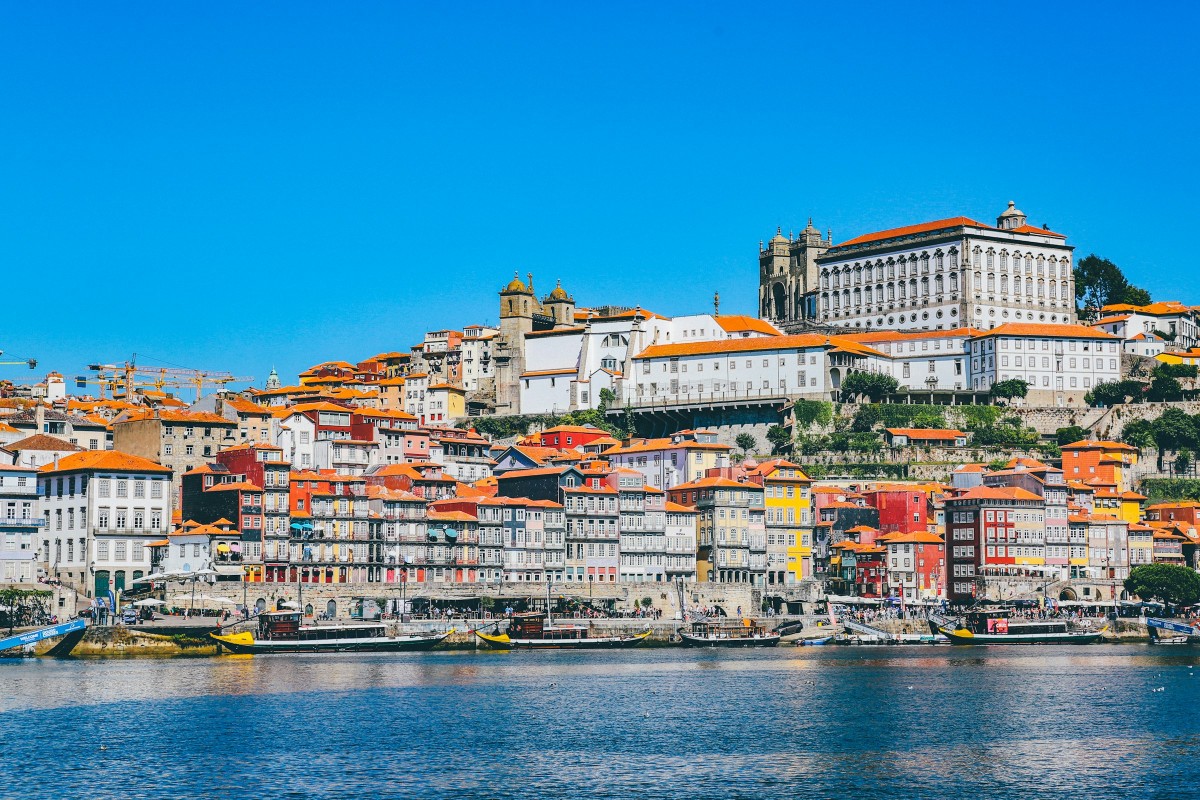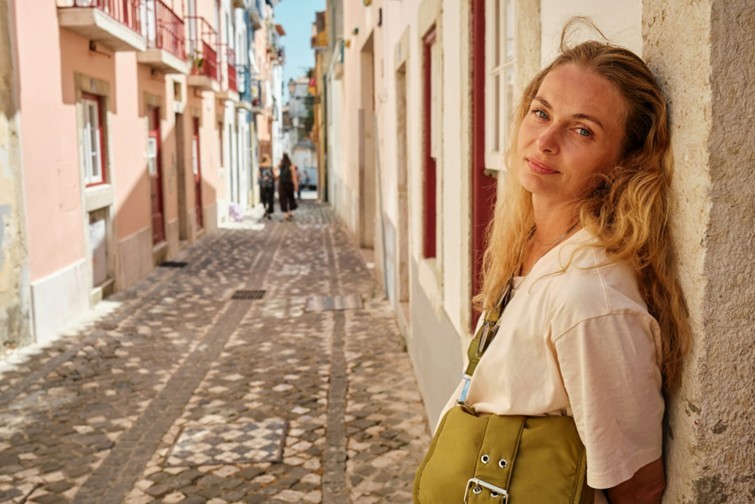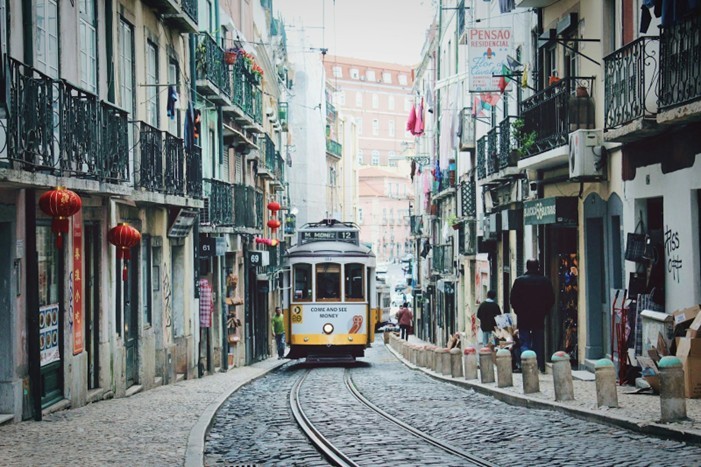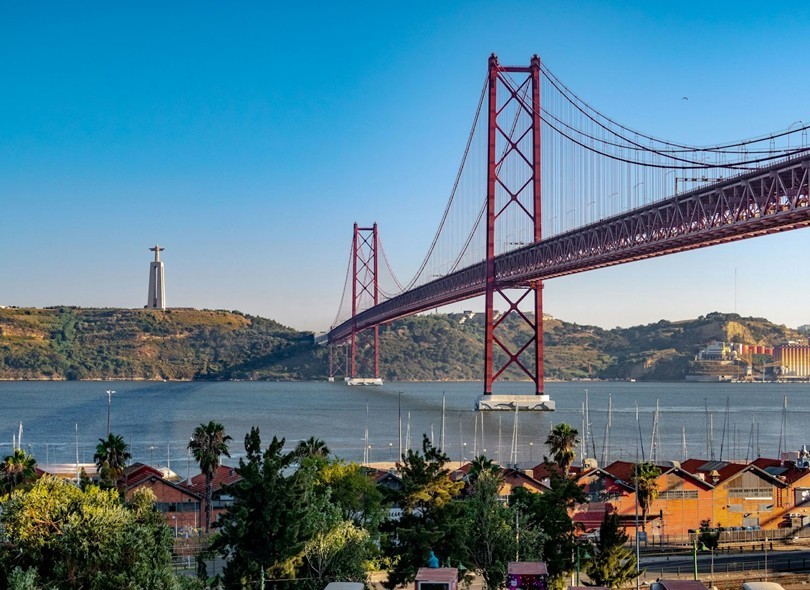
Dreaming of sun-drenched beaches, charming cobblestone streets, and a relaxed Mediterranean lifestyle?
Come on, who isn't?
If you're finally in the position where you can actually make the move, then Portugal might be calling for you.
But before you pack your bags and book that one-way ticket, it's crucial to have a clear understanding of the cost of living. How much does everything cost, and is this beautiful country right for you?
In this comprehensive guide, we're breaking everything down. All the expenses, from housing and groceries to healthcare and leisure, so you can confidently plan your Portuguese adventure.
Let's go.
Key takeaways
- Portugal offers a relatively affordable cost of living compared to many other Western European countries and the US. One study found that consumer prices in the US are 74% higher than in Portugal.
- Regional variations exist, with major cities like Lisbon and Porto being more expensive than smaller towns and rural areas.
- Your lifestyle choices significantly impact your expenses.
- Careful budgeting and smart choices can help you live comfortably, even on a moderate budget.
- An introduction to the average cost of living in Portugal
- What is the real cost of living in Portugal?
- Utility cost of living prices in Portugal
- Grocery and food cost of living prices in Portugal
- Transportation options and costs in Portugal
- The costs of healthcare services in Portugal
- Leisure activities and dining out costs in Portugal
- Can you live comfortably in Portugal on different budgets?
- What is the cost of living to retire in Portugal?
- Portugal vs. the World: Cost of living comparison
- Wrapping up
- FAQs
An introduction to the average cost of living in Portugal

Portugal certainly feels like an obvious choice for living out your migrant dream.
The westernmost European country consistently ranks as one of the most budget-friendly countries in Western Europe, offering a fantastic quality of life, low crime rates, excellent cultural opportunities, great food, excellent healthcare, and so much more.
Think of it this way: you can enjoy those stunning beaches, savour delicious pastéis de nata, and explore centuries-old castles, all while spending significantly less than you would in many other European countries or the US.
But how much are we actually talking?
On average, living in Portugal is about 36% cheaper than in the United States and the United Kingdom, with some prices up to 74% more affordable.
For a single person, you can expect monthly costs (excluding rent) to be around €666 (roughly £554).
If you plan to move with your family, a family of four can expect to spend about €2,356.6 (£1,960) per month, again without rent.
Of course, these are just average figures.
Your actual costs will depend on your lifestyle and where you choose to settle down, so take the rest of this guide with a pinch of salt.
Big cities like Lisbon and Porto naturally have a higher price tag, but smaller towns and rural areas offer incredible value.
And if you choose to live big, buy premium luxury furniture brands, pay for the latest iPhone, and so on, then, of course, you'll be paying more.
We're keeping our eye on the fundamentals here.
For example, rent is particularly attractive in Portugal, averaging a whopping 40% lower than in the UK (and around 52% cheaper than the US).
In Lisbon, a one-bedroom apartment in the city centre will set you back around €916 per month, but you can find much cheaper options in smaller towns.
Food is another pleasant surprise.
Portugal boasts some of the lowest supermarket spending in the world, with the average person shelling out just €270 per month on groceries.
Even with these affordable costs, it's important to remember that prices have been gradually rising, with an average inflation rate of 2.7%. However, this moderate increase will unlikely affect Portugal's status as a budget-friendly paradise anytime soon.
What is the real cost of living in Portugal?

So, now we're on the same page, let's really break down how much everything costs, on average, in Portugal and whether or not this is suitable for your budget.
Housing costs in Portugal
Whether you're dreaming of a cosy apartment in Lisbon, a charming villa in the Algarve, or a rustic farmhouse in Alentejo, finding the right place to call home is essential for a comfortable life.
As always, renting or buying in Portugal has its own pros and cons:
- Renting: Renting in Portugal offers flexibility, especially if you're new to Portugal or unsure about your long-term plans. It also involves lower upfront costs, as you won't need a hefty down payment. You also won't need to maintain the home but pay out for maintenance.
- Buying: If you're in it for the long haul, buying property can be a smart investment, especially with Portugal's relatively affordable real estate market compared to other Western European countries.
Rental costs vary significantly depending on location and property type. Here's a quick overview of average rental prices in some popular areas:
Lisbon
- One-bedroom apartment in the city centre: €1,420 per month
- One-bedroom apartment outside the centre: €991 per month
- Three-bedroom apartment in the city centre: €2,648 per month
- Three-bedroom apartment outside the centre: €1,619 per month
Porto
- One-bedroom apartment in the city centre: €1,012 per month
- One-bedroom apartment outside the centre: €833 per month
- Three-bedroom apartment in the city centre: €1,887 per month
- Three-bedroom apartment outside the centre: €1,369 per month
Algarve: Rental prices can fluctuate greatly, with luxury villas reaching up to €2,000 per month, but these start around €500 per month.
Smaller Cities (e.g., Coimbra, Aveiro): You can find one-bedroom apartments starting from around €500 per month, although most expats will probably be renting around the €1,000 mark.
Buying property in Portugal
If you're considering buying property in Portugal, here are some average property prices to give you a starting point:
- Lisbon Metropolitan Area: €3,765 per square metre (house)
- Porto Metropolitan Area: €3,571 per square metre (house)
Remember that these are just averages, and prices can vary depending on location, property condition, and market trends.
The best thing to remember here is to do your own research based on what you want. Again, cities tend to be more expensive, with rural areas more affordable.
Simply pick that location and use websites like Idealista, BuyProperty, or ImoVirtual to see what prices are at the moment.
Other housing factors to consider
And don't forget to factor in these extra expenses:
- Property taxes:
- IMI (Municipal Property Tax): An annual tax ranging from 0.3% to 0.45% of the property's value.
- AIMI (Additional Municipal Property Tax): Applies to properties valued over €600,000, with rates from 0.4% to 1%.
- Maintenance Costs:
- For a one-bedroom apartment in Lisbon: Approximately €3,000 per year
- For a three-bedroom villa in Faro: Around €5,000 per year
- Utilities: The average monthly cost for an 85m² apartment is €102 across Portugal. More on this shortly.
- Insurance: Standard property insurance can cost between €180-380 per year. Basic insurance starts at around €60 a year.
By carefully considering these factors, you can decide whether to rent or buy and find the perfect home that fits your budget and lifestyle.
Utility cost of living prices in Portugal

Utility costs are crucial to understand when it comes to effective budgeting, so let's break down what you can expect to pay for electricity, water, gas, and internet in 2025.
For a typical Portuguese household, monthly utility costs can range from €100 to €200, depending on factors like property size, location, and usage habits.
This estimate covers the basics: electricity, water, gas, and garbage collection.
Electricity
Electricity in Portugal is a bit pricier compared to other European countries, averaging €0.2246 per kWh. That's about 22% higher than in the UK, so it's something to keep in mind.
You can expect to pay around €60 per month for electricity for a one-bedroom apartment.
Pro tip: To keep those electricity bills in check, try to use energy-intensive appliances during off-peak hours and opt for energy-efficient devices whenever possible.
Water
Water costs can vary quite a bit across different regions in Portugal. On average, you'll likely spend between €15 and €30 per month for a one-bedroom apartment. Porto tends to have the highest water rates, while Braga and Faro boast the lowest.
Gas
Your gas bill will depend on how much you use and how it's supplied to your home. For a one-bedroom apartment, you can estimate around €20 per month for gas.
If you use bottled gas, a 13-kg butane cylinder will cost you about €27 and should last a family of three for about a month.
Internet and telecommunications
Internet services in Portugal are considered pretty reasonable. You can snag a 2-year home internet contract with speeds of 200Mb for €37 per month or upgrade to 1000Mb for €49 per month.
If you want to bundle your internet with TV and mobile services, expect to pay around €50 to €60 per month.
Regional variations
Just like with housing, utility costs can differ depending on where you live in Portugal. Here are some average monthly utility costs for popular areas:
- Albufeira: €145
- Lisbon: €123
- Porto: €114
- Algarve: €102
- Faro: €68
Also, keep in mind that your utility bills might fluctuate with the seasons. In winter (December to February), you'll likely see higher heating costs. During the summer months, air conditioning usage can drive up your electricity bill.
Grocery and food cost of living prices in Portugal

One of the joys of living in Portugal is indulging in its vibrant culinary scene.
From fresh seafood and colourful produce to hearty stews and delectable pastries, there's something to tantalise every taste bud.
But how much will all this deliciousness cost you?
Good news is that groceries in Portugal are refreshingly affordable compared to many other Western European countries.
The average monthly grocery bill for a single person ranges from €150 to €350, depending on your lifestyle and where you live.
As of January 2025, the "cabaz alimentar essencial" (essential food basket), which includes 63 staple products for a typical Portuguese diet, costs around €279.
While this represents a slight increase from previous years, Portugal still maintains its reputation as a budget-friendly haven, especially compared to other European countries.
Average costs of everyday food items in Portugal
To give you a clearer picture, here are some average prices for common food items in Portugal:
- Milk (1 litre): €0.94
- Loaf of fresh white bread (500g): €1.36
- Rice (1kg): €1.40
- Eggs (12): €2.68
- Local cheese (1kg): €10.25
- Chicken fillets (1kg): €6.72
- Beef round (1kg): €12.23
- Apples (1kg): €1.97
- Tomatoes (1kg): €2.21
- Potatoes (1kg): €1.49
Remember that prices can vary depending on the region and the type of store you visit. In Lisbon, for example, you might find that a loaf of white bread costs around €1.40 and beef is priced at €10.68 per kilogram.
Where to shop in Portugal
Portugal offers a diverse range of grocery shopping options to suit every need and budget:
- Supermarkets: Major chains like Continente, Pingo Doce, Auchan, Intermarché, Lidl, and Aldi are widespread across the country. Continente tends to be slightly more expensive, while Lidl and Aldi are known for their budget-friendly prices.
- Hypermarkets (Hipermercados): These large stores, often located in shopping centres, offer a vast selection of products, including groceries and non-food items.
- Local markets (Mercados): Almost every district in Lisbon and other cities boasts its own indoor market with stalls selling local produce, fresh seafood, meats, cheeses, and more. These markets often offer better value than supermarkets and are beloved by locals for their quality and variety.
- Small grocery stores (Mercearias): These neighbourhood shops are perfect for quick purchases and sometimes offer competitive prices on certain items.
- Organic markets: If you're looking for organic products, you'll find specialised markets and shops in many cities. Porto has an organic market in the city park on Saturday mornings, while Lisbon has one in Praça do Príncipe Real.
Pro tip: While supermarkets offer convenience, local markets often provide the freshest produce at the best prices. Many Portuguese meals are based on locally sourced ingredients, making markets an excellent choice for quality and affordability.
Transportation options and costs in Portugal

Portugal offers a variety of transportation options, from efficient public transit to the freedom of car ownership.
Of course, this all comes down to personal preference. If you choose to live in the city, you may not need a car. If you're further out in the sticks, then it may be essential.
Public transportation
Portugal boasts a well-developed and affordable public transportation system, especially in major cities like Lisbon and Porto. It's pretty accessible and is considered good by most.
Here's a breakdown of the main options:
- Metro systems: Lisbon's metro is a fantastic way to navigate the city, offering quick and convenient access to most areas. A single metro ride will set you back €1.80, but you can grab a 24-hour unlimited travel pass for €7, including buses and trams. If you plan on using public transport frequently, consider the "Zapping" option on the reusable Navegante card for discounted fares at €1.47 per trip.
- Buses and trams: Lisbon's buses and trams offer a charming way to experience the city, with fares starting at €2.20 for a single bus trip and €3.20 for a tram ride. The iconic Tram 28, a popular tourist route, might be a bit pricier. Many cities offer comprehensive day passes that cover various modes of transport, making it easy and cost-effective to explore.
- Train services: For intercity travel, Portugal's train network is a reliable and reasonably priced option. A high-speed Alfa Pendular train from Lisbon to Porto costs between €33.90 and €47.40, depending on the class of service.
Of course, there are ride-sharing services like Uber. It's a bit more expensive than taxis or buses but still considered reasonable. You can use the trip estimator for more up to date prices, important since costs can change based on location and real-time demand.
The costs of car ownership
While public transportation shines in urban areas, many residents prefer the freedom and flexibility of car ownership, particularly in rural regions. However, it's important to weigh the costs involved:
- Purchase and registration: Car prices in Portugal are generally on par with those of other Western European countries. However, you'll also need to factor in registration fees for imported vehicles (€55-65), a one-off vehicle tax (ISV) that varies based on the car's type and CO2 emissions, and an annual circulation tax (IUC) to renew your license plates and road use permission.
- Insurance: Car insurance is mandatory in Portugal. Basic third-party liability insurance starts at around €150-200 per year, while comprehensive coverage can range from €350 to €600 annually, depending on factors like your age and the type of vehicle you drive.
- Fuel costs: As of January 2025, fuel prices in Portugal are €1.80 per litre for petrol and €1.70 per litre for diesel. These prices can fluctuate depending on global oil markets and government policies.
- Maintenance and inspections: Regular maintenance costs will vary, but mandatory vehicle inspections (IPO) cost around €30. These inspections are required every two years for vehicles 4-8 years old and annually for older vehicles.
In 2022, the average monthly cost of car ownership in Portugal, including depreciation, was estimated at €1,160. However, this figure can vary significantly based on the car model, your driving habits, and individual circumstances.
The costs of healthcare services in Portugal

Portugal offers a robust and accessible healthcare system that caters to both residents and expats. Right off the bat, it's a free healthcare service, so no need to buy insurance, with private options if you wish.
The public healthcare system: Serviço Nacional de Saúde (SNS)
Portugal's public healthcare system, known as the SNS, provides universal coverage to all Portuguese citizens, legal residents, and even some undocumented migrants.
Funded primarily through taxes and social security contributions, the SNS offers a comprehensive range of services, including:
- Primary care (through local health centres called Centros de Saúde)
- Specialist consultations
- Hospital treatments and surgeries
- Emergency services
- Maternity care
- Mental health services
While the SNS is largely free, you'll encounter small co-payments for certain services, typically ranging from €5 to €10. Prescription medications are also subsidised, making them significantly more affordable.
However, services like dentistry are not covered by the SNS, and will need to be paid for on a private basis.
Also, note that while the SNS is known for providing high-quality care with universal access, non-urgent treatments may involve longer waiting times due to high demand.
The private healthcare system
Alongside the public system, Portugal has a thriving private healthcare sector that offers faster access to specialists, shorter waiting times, and more personalised care.
Private healthcare comes with a higher price tag, but it's still relatively affordable compared to other Western European countries. Here are some examples of private healthcare costs:
- Specialist consultations: €50–€100
- Routine diagnostic tests: €20–€100
- Private hospital stays: €200–€400 per night
How to choose your health insurance options
- Public health insurance: As a legal resident, you're automatically covered under the SNS. To register, you'll need to obtain a health user card (cartão de utente) at your local health centre.
- Private health insurance: About 20-30% of residents choose to supplement their public coverage with private health insurance or gain access to private facilities. Private insurance typically covers services like dental care, cosmetic procedures, and expedited specialist appointments.
Private health insurance plans vary in cost and coverage:
- Basic plans: €20–€50 per month
- Comprehensive plans: €50–€150 per month
Major private insurance providers in Portugal include Médis, Multicare, Allianz, and Fidelidade.
Generally, the SNS will be more than acceptable for general healthcare needs. However, if you require more specialised treatment, perhaps for a condition or operation, private may be the best approach.
Key considerations for healthcare in Portugal
- Emergency Care: Public hospitals provide emergency care to everyone, regardless of insurance status.
- Waiting Times: While public healthcare offers excellent services, private insurance can help you bypass long waiting lists for non-urgent treatments.
- Regional Access: The SNS operates through five regional health administrations across mainland Portugal, while Madeira and the Azores have their own separate systems.
As with most European countries, Portugal's healthcare system provides a balanced mix of public and private services, ensuring quality care for all residents.
Whether you choose to rely on the affordable SNS or opt for private insurance for added convenience, you can rest assured that you'll have access to comprehensive medical support.
Leisure activities and dining out costs in Portugal

Beyond the essentials, Portugal offers vibrant opportunities for leisure activities and experiences to enrich your life, such as dining out or having fun.
Whether you're a culture enthusiast, a foodie, or simply enjoy exploring new places, Portugal has something for everyone.
Leisure activities and Portugal's cultural scene
Portugal's rich cultural heritage provides numerous options for entertainment, from historical sites and museums to modern attractions and lively events.
- Cinema: Catch the latest blockbusters for around €7.50 per ticket. Or, for a unique cinematic experience, check out venues like the Cinemateca Portuguesa in Lisbon, which showcases classic and art house films.
- Museums: Immerse yourself in history and art at Portugal's many museums, with entry fees typically ranging from €2 to €10. Some popular choices include the National Tile Museum in Lisbon, the Castelo de S. Jorge, and the 3D Fun Art Museum in Funchal.
- Concerts and Shows: Enjoy live music, theatre performances, and dance shows, with prices varying depending on the event and venue. In Lisbon, you can catch international artists like Kylie Minogue and Il Volo at the MEO Arena or experience the passion of flamenco at a local dance show.
- Fitness and Sports: Stay active with a gym membership, which costs around €37.60 per month on average. For court hires, such as tennis, you're looking at prices around €13.60 per hour, depending on location and demand.
- Cultural Events: Lisbon hosts various festivals throughout the year, such as the lively Carnival in February and the New Year's Concert in January. Ticket prices for these events typically range from €5 to €18.
Savouring Portuguese cuisine through dining out
Portuguese cuisine is renowned for its fresh ingredients, bold flavours, and affordability. Whether you're craving a casual meal or a special occasion feast, you'll find plenty of options to satisfy your appetite.
- Casual dining: Enjoy a meal at an inexpensive restaurant for around €10, or indulge in a three-course meal for two at a mid-range establishment for approximately €45. If you're in a hurry, a fast-food combo meal will cost you around €8 on average.
- Drinks: Quench your thirst with a domestic beer (0.5-litre draught) for €2.50, a cappuccino for €1.85, or a bottle of mid-range wine for €5.
- Local Specialities: Don't miss out on trying traditional Portuguese dishes like Bacalhau à Brás (a codfish dish) for around €13 or Caldo Verde (a hearty kale soup) for €4 to €8. For a budget-friendly option, look for the "Prato do Dia" (dish of the day) at a local Tasca, which often includes soup and coffee for €6-8.
For the best value, seek out family-run establishments where you can enjoy traditional Portuguese meals for under €10.
In terms of tipping culture, tipping is not obligatory but always appreciated. Leaving a few euros or rounding up the bill is a common practice.
Can you live comfortably in Portugal on different budgets?

Now we've explored the various costs associated with living in Portugal, let's put it all together and see how different budgets translate into other lifestyles.
€1,500 a month: Comfortable living with careful budgeting
Living on €1,500 a month in Portugal is definitely doable, especially if you choose to live outside the major cities.
However, it will require careful budgeting and some trade-offs. This budget is above the average net salary of €1,044 per month, so you'll be able to cover your basic needs and enjoy some leisure activities.
Potential allocations:
- Rent: €600-€800 for a small apartment outside city centers
- Utilities: €100-€150
- Groceries: €300-€350
- Transportation: €50-€100 (using public transport or a bicycle)
- Healthcare: €50 (basic private insurance)
- Leisure: €100-€200
Trade-offs and limitations:
- Limited dining out options, mostly at inexpensive local restaurants
- Minimal budget for travel or expensive hobbies
- May need to live in a smaller apartment or shared accommodation in larger cities
- Less flexibility for unexpected expenses or savings
€2,000 a month: More comfort and flexibility
With a monthly budget of €2,000, you can enjoy a more comfortable lifestyle in most parts of Portugal, including smaller cities and some areas of Lisbon and Porto.
This budget is well above the average salary and can provide a good quality of life for a single person or even a couple.
Potential allocations:
- Rent: €800-€1,000 for a decent apartment, possibly in the city centres
- Utilities: €150-€200
- Groceries: €400-€500
- Transportation: €100-€150 (including occasional taxi rides or car-sharing)
- Healthcare: €100 (comprehensive private insurance)
- Leisure and Dining Out: €300-€400
- Savings: €100-€200
Possibilities:
- Regular meals at mid-range restaurants
- Occasional weekend trips within Portugal
- Gym membership or other regular leisure activities
- Some room for savings or unexpected expenses
€3,000 a month: Enjoying the best of Portugal
With €3,000 per month, you can experience a very comfortable lifestyle in most parts of Portugal, including the more expensive areas of Lisbon and Porto. This budget allows for a high quality of life for a couple or small family.
Potential allocations:
- Rent: €1,200-€1,500 for a spacious apartment in desirable areas
- Utilities: €200-€250
- Groceries: €500-€600
- Transportation: €200-€300 (possibly including car expenses)
- Healthcare: €150-€200 (premium private insurance)
- Leisure, Dining Out, and Travel: €600-€800
- Savings: €300-€500
Enhanced possibilities:
- High-quality housing in prime locations
- Regular dining at upscale restaurants
- Frequent domestic travel and occasional international trips
- Ability to indulge in expensive hobbies or cultural activities
- Significant savings potential for future investments or retirement
This budget allows you to enjoy most of the amenities and experiences Portugal has to offer, from savouring the best local cuisine to exploring the country's rich cultural heritage and natural beauty.
It also provides a substantial buffer for unexpected expenses and long-term financial planning.
What is the cost of living to retire in Portugal?

Portugal is quickly becoming a top choice for retirees seeking a fulfilling and affordable lifestyle. But is it the right place for your move?
Why move to Portugal to retire?
Portugal offers a compelling combination of factors that make it an ideal retirement destination:
- Non-Habitual Resident (NHR) Tax Regime: While this program has undergone some changes in recent years, it can still offer significant tax advantages for retirees. If you registered for the NHR regime before March 31, 2020, your foreign pension income is generally tax-free. Retirees who registered from April 2020 until the program's closure are subject to a flat 10% tax rate on foreign pension income.
- Other financial benefits: Portugal has no wealth tax, offers tax exemptions on gifts for direct family members, and allows for free remittance of funds to Portugal.
- High quality of life: Enjoy a relaxed Mediterranean lifestyle with a favourable climate, stunning beaches, charming towns, and a rich cultural heritage.
- Lower cost of living: Compared to many Western European countries, Portugal offers a more affordable cost of living, allowing you to stretch your retirement savings further.
What are the estimated monthly expenses for retirees?
You can live comfortably in Portugal on a moderate budget. Here's a breakdown of potential monthly expenses:
For a budget of €2,000 per month:
- Rent: €800-€1,000 for a decent apartment
- Utilities: €150-€200
- Groceries: €400-€500
- Healthcare: €100 (comprehensive private insurance)
- Leisure and Dining Out: €300-€400
For a more luxurious lifestyle at €3,000 per month:
- Rent: €1,200-€1,500 for a spacious apartment in desirable areas
- Utilities: €200-€250
- Groceries: €500-€600
- Healthcare: €150-€200 (premium private insurance)
- Leisure, Dining Out, and Travel: €600-€800
These budgets allow for a comfortable lifestyle, including regular dining out and leisure activities.
Visa requirements and healthcare considerations in Portugal
Visa requirements
Retirees from non-EU countries can apply for a residence permit through various options:
- Portugal Golden Visa Program: This program involves making a qualifying investment in Portugal.
- D7 Visa: Designed for financially independent individuals, including retirees.
- D8 Visa: Suitable for digital nomads or remote workers who want to retire in Portugal.
EU citizens don't need a specific visa but should register for residence after three months.
Healthcare considerations:
- Portugal offers a public healthcare system (SNS) that provides nearly free services to residents.
- Retirees often opt for private health insurance for faster specialist access and more comprehensive coverage.
- Private health insurance costs range from €50 to €200 per month, depending on your age and coverage level.
Portugal's healthcare system is generally high-quality, with modern facilities and well-trained medical professionals.
Retiring in Portugal offers a fantastic blend of financial benefits, a high quality of life, and excellent healthcare options.
While the NHR regime has changed, it's clear that Portugal remains an attractive destination for retirees seeking a balance of affordability, culture, and pleasant living conditions.
Portugal vs. the World: Cost of living comparison

So, with Portugal's cost of living prices fresh in our mind, how does it stack up against other popular destinations?
| Country | Overall Cost of Living Index (Portugal = 100) | Rent Index (Portugal = 100) | Groceries Index (Portugal = 100) | Restaurant Prices Index (Portugal = 100) |
| Portugal | 100 | 100 | 100 | 100 |
| United States | 138.1 | 155.8 | 189 | 191 |
| United Kingdom | 139.1 | 132.2 | 142.5 | 145 |
| Spain | 105 | 105 | 102 | 103 |
| France | 125 | 120 | 115 | 120 |
| Italy | 118 | 110 | 108 | 115 |
| Germany | 120 | 115 | 110 | 118 |
| Netherlands | 130 | 125 | 118 | 125 |
| Switzerland | 160 | 150 | 145 | 155 |
| Canada | 135 | 140 | 135 | 140 |
| Australia | 140 | 145 | 140 | 145 |
Note: These are approximate index values based on various sources and may vary depending on the specific location and lifestyle.
Portugal vs. United States
Overall, consumer prices in Portugal are a whopping 38.1% lower than in the US (excluding rent).
Rent prices are even more attractive, with Portugal boasting a 55.8% lower average rent than the US. To put it into perspective, the average monthly cost of living for a single person in Portugal is €1,751, compared to $3,381 (€3,051) in the US.
Here's a closer look at some key expense differences:
- Housing: A one-bedroom apartment in Lisbon's city centre costs around €927.18 per month, while a similar apartment in a major US city would likely be significantly higher. Even purchasing an apartment is more affordable in Portugal, with prices in Lisbon's city centre averaging €6,480 per square metre, compared to €7,277 in Washington DC.
- Groceries: Grocery prices in the US are a staggering 89% higher than in Portugal. Portuguese households spend an estimated €270 per month on groceries in 2025, while basic food items like bread (€1.20-2.90 per loaf), milk (€0.80-1.10 per litre), and eggs (€1.80-5.20 for 12) remain refreshingly affordable.
- Restaurant prices: Dining out is also more budget-friendly in Portugal, with restaurant prices 91% higher in the US.
Portugal vs. United Kingdom
While the difference is less pronounced than with the US, Portugal still offers a lower cost of living than the UK.
The overall cost of living, including rent, is 39.1% higher in the UK than in Portugal. Rent prices in the UK are 32.2% higher, and consumer prices (excluding rent) are 42.5% higher.
It's clear that Portugal's cost of living remains competitive, especially when compared to other Western countries.
While certain expenses like fuel may be higher in Portugal, the overall affordability in areas such as housing, groceries, and healthcare makes it an attractive option for those seeking a high quality of life at a lower cost.
Wrapping up
There's little doubt that Portugal offers a unique blend of affordability, culture, and natural beauty, making it an ideal destination for those seeking a fulfilling and cost-effective lifestyle.
Whether you're drawn to the vibrant cities, charming towns, or tranquil countryside, you'll find that living in Portugal is more affordable than you might expect.
And we hope this guide has helped you make your decision.
By understanding the key expenses involved and implementing smart saving strategies, you can stretch your budget further and enjoy a comfortable life in this beautiful country.
FAQs
Still have some burning questions about moving to Portugal? Here are some frequently asked questions that cover additional aspects of expat life in Portugal:
What is the healthcare system like in Portugal?
Portugal offers a two-tiered healthcare system: public and private. The public system, known as the Serviço Nacional de Saúde (SNS), provides universal coverage to residents and offers a wide range of services at little to no cost.
Many expats also opt for private health insurance to supplement public coverage, gain access to private facilities, and experience shorter waiting times for non-urgent procedures.
Private health insurance typically costs between €50 and €200 per month, depending on your age and the level of coverage you choose.
How easy is it to open a bank account in Portugal?
Opening a bank account in Portugal is generally a straightforward process for expats.
The first step is obtaining a Tax Identification Number (NIF), a unique number used for tax purposes. Fortunately, the NIF is assigned automatically when you open a bank account, simplifying the process.
What is the education system like for expat children?
Portugal offers a variety of educational options for expat children, including both public and international schools.
Public schools are generally free for residents, while international schools offer a more internationally recognised curriculum and cater specifically to foreign students.
If you're considering higher education, degrees from Portuguese universities are recognised throughout the EU.
How is the work-life balance in Portugal?
Portugal is known for its relaxed lifestyle and emphasis on work-life balance. The country values leisure time and family life, reflected in many businesses closing for lunch breaks and remaining closed on Sundays.
What are the options for learning Portuguese?
While English is spoken in many urban areas of Portugal, learning Portuguese can significantly enhance your experience and integration into the local culture.
There are numerous language schools and online resources available to help expats learn Portuguese. Some cities even offer free or low-cost language courses for residents.
How reliable is the internet and technology infrastructure in Portugal?
Portugal boasts a modern and reliable telecommunications infrastructure, especially in urban areas.
High-speed internet is widely available, and many accommodations cater specifically to digital nomads with strong internet connections and modern amenities.
